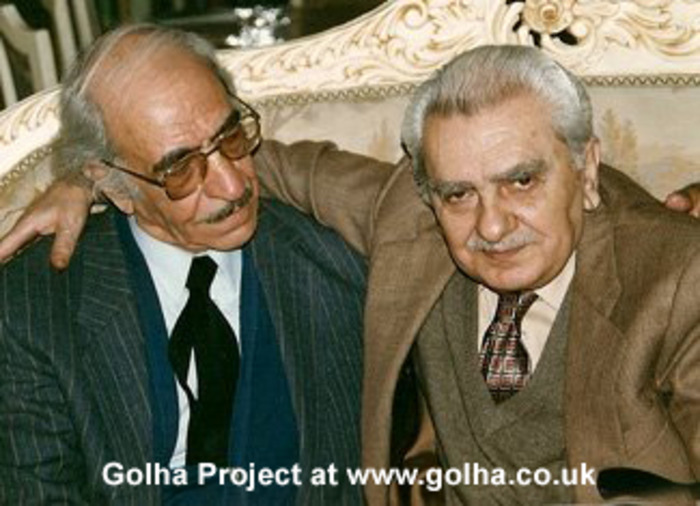Navab Safa

Biography
Navab Safa, Sayyid Isma’il (1924-2005), son of Sayyid Murtaza Navab Safawi. Iranian writer, researcher, poet, and lyricist of renown who gained fame for his very elegant lyrics which he composed for vocalists of renown, e.g. Ghulam Husayn Banan, Daryush Rafi’i, Dilkash, Puran, Nahid Sarafraz, ‘Ahdiya, Marziya, Ilaha, Nahid, Shahnaz Khayyam, ‘Abdul’ali Waziri, Husayn Qawami, Azar ‘Azima, Manuchihr Humayunpur, Ghazal, Shams, Parwin, Huma, Mahin Sayyadi, Mahasti, Hayida, Yasamin, Zuhra, Husayn Khwaja Amiri (Iraj), Andisha, Akabar Gulpayigani, Simin Ariyan, Muntashiri, ‘Abbas Hikmatshi’ar, Firuza, Aminullah Rashidi, and Ruhbakhsh. Born in Kermanshah, his father was a devotee of the Sufi order of Safi ‘Alishahi Ni’matullahi who was accorded the title Navab’ali by the chief shaykh of the Safi ‘Alishahi Ni’matullahi Sufi order at a meeting with Zahir al-Dawla in Ja’farabad, Shimiran. His father was originally one of the Navabs of Isfahan. The families who attributed their lineage to the Safavids were generally accorded the title Navab in Isfahan. His administrative offices led him to settle in Kermanshah, where Navab Safa received his preliminary education. Navab Safa after a while, accompanied by his family, traveled to Gurgan and then settled in Tehran. He published his first poem at the age of 10 in 1944 in the Tawfiq newspaper whose editor-in-chief and license holder were Abulqasim Halat and Muhammad ‘Ali Tawfiq respectively. He joined the editorial board of the Tawfiq at the suggestion of Halat and after a while opened a column under his nom de plume Murshid Safa. He joined the first congress of poets and writers held in the summer of 1946 at the Iran-USSR Cultural Relations Society presided by Muhammad Taqi Bahar (Malik al-Shu’ara’); Sadiq Hidayat was a member of its directorate board. Navab Safa wrote his first lyric on a Kermanshahi melody which became well-known as Wa’da-yi Gulrukhan. It was arranged by Majid Wafadar and was sung by Ruhbakhsh in 1945. It was later performed by vocalists like Muluk Zarrabi, Malika-yi Hikmatshi’ar, Ruhangiz, and Parwa. Navab Safa was in his prime of life and the radio station had been established five years before. He made the acquaintance of Isma’il Mihrtash in 1947 who had founded the Barbad Society shortly before that time. It was in their meetings that Navab Safa made the acquaintance of Husaynquli Musta’an who was the director of the Radio at that time. Musta’an was a renowned writer and his translation of Victor Hugo’s Les Miserables was famous. Thus, he entered the Radio and his acquaintance with musicians, vocalists, and poets of renown prepared him for his artistic career. He joined the editorial board of the Radio, served as the director of the board, and supervised radio programs. Navab Safa regarded Musta’an as his teacher of the art of eloquence and repeatedly made mention of him. In his early career, Navab Safa wrote preludes for theaters in Tehran. He also published his political poetry under the nom de plume Mawlana Safa in journals like Tihran Musawwar. His collaboration with Majid Wafadar began after his song entitled Wa’da-yi Gulrukhan. His further lyrics written on the musical compositions of Majid Wafadar, about 16 in number, include Dunya-yi Man, Ah-i Bi-athar, Khakistar-i Man, Ru’ya-yi Shirin, Dilnawaz, Amad Naw Bahar, Bigiryyim (an elegy on Saba’s death), Ahangi dar Nawa, A’in-i Wafa. . His meeting with Mahdi Khalidi at Majid Wafadar’s home led to the performance of a joint work with Khalidi under the title of Rafti, in the Dastgah of Shur, which was performed by Dilkash 1947. He also held administrative offices of a diverse nature, he was a member of the National Consultative Assembly, director of the secretariat of the Ports and Navigation Organization, and director of the public relations of Tehran Municipality. His works include: Tafsir-i Panj Qasida az Asadi Tusi; Naghma-yi Mihr, devoted to the biographical accounts of five poets and mystics of renown: Rumi, Sa’di, Hafiz, Baba Tahir, and Khwaja ‘Abd Allah Ansari; collections of poetry: Az Yad Rafta and Tak Darakht; editions and commentaries on Safarnama-yi Farhad Mirza Mu’tamid al-Dawla (with a detailed biographical account of Farhad Mirza) and Munsha’at-i Farhad Mirza. He led a life of seclusion from 1979 to 2004, devoting his time to studies, writing, collaboration with some Iranian composers, like Asadullah Malik, and writing his autobiography, entitled Qissa-yi Sham’.
Qissa-yi Sham’